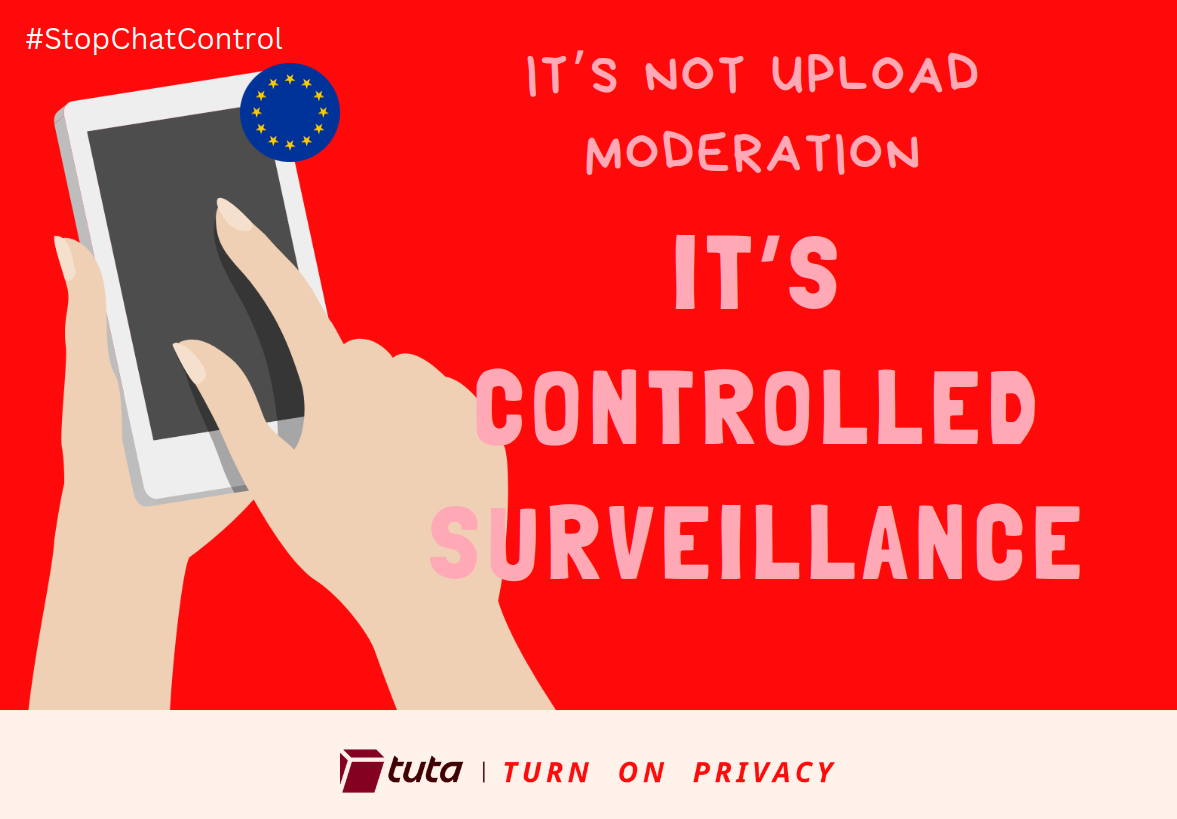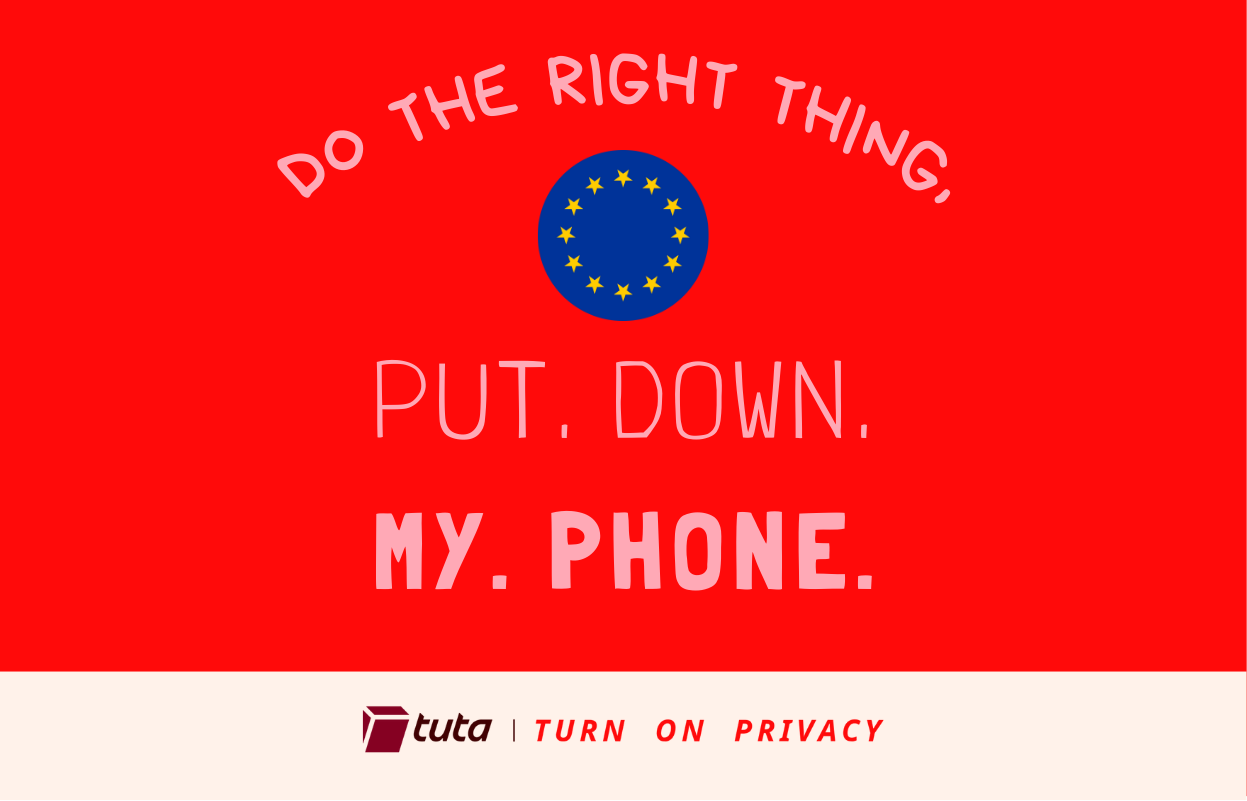Call "Upload Moderation" by its real name: Chat Control!
Once again public pressure led to politicians stopping their push for mass surveillance - but the fight continues!
What happened?
On June 20th, the Belgian Council Presidency failed with the vote on Chat Control, mainly due to the opposition of Germany. Negotiations between the EU member states were stopped because it became apparent that the required majority would not be reached. The Presidency therefore decided to remove the item from the agenda. This law contained legal obligations for chat and email providers to scan every message for child sexual abuse material (CSAM), even if the data were encrypted. This form of mass surveillance without cause would have been the first in Western democracies, but Five Eyes nations would have been eager to follow suit.
Germany and Poland were strongly opposed against Chat Control, which would have allowed client-side scanning in the EU - a method that Germany has been opposing since beginning of 2023 saying “there is no prosecution at any cost”. In addition, there would have been abstentions from Estonia, the Netherlands, Slovenia, the Czech Republic, and Austria. The population of approving countries amounted to 63.7% of EU citizens - out of the needed 65%. It was a very close call!
The EU member states have been trying to agree on a common position for two years. The new vote got scheduled because France - a country that also wanted to introduce their own ban on end-to-end encryption - left the blocking minority, saying it might vote in favor or chat control. However, even with France having changed their mind, the majority could not be reached.
This is the second time that the EU states could not agree on chat control. In December, Spain already failed, just like Belgium did now.
One reason for chat control being off the table once again is the huge opposition it faces from the largest EU member state: Germany.
On June 18th, German politicians published an open letter with the title: “Warning against chat control”. They were convinced that the proposed measures were incompatible with European fundamental rights, the letter stated. They are calling on
”national governments to stand up for secure communication, strong encryption and digital privacy and therefore reject the current compromise proposal of the Belgian Council Presidency."
"The Belgian EU Council Presidency seems determined to achieve a general approach to the highly controversial CSA Regulation regardless of the consequences. In doing so, it is putting the privacy of all our communications at risk. We are opposing these plans in a joint open letter signed by 36 parliamentarians from EU national parliaments and from the ranks of the European Parliament."
"It is clear to us that we must fight sexualized violence against children and the exploitation of children, including the dissemination of such material, with determination and in accordance with the rule of law. However, if we tackle this important issue in line with the EU Commission, we risk neither protecting children nor making key aspects of the regulation compatible with European fundamental rights."
" We are alarmed and fear that the EU Council’s current proposal would simply undermine the confidentiality of private communications.”
The German Minister of Justice, Marco Buschmann, has called together a similar initiative: Together with four counterparts from Liechtenstein, Luxembourg, Austria and Switzerland, he has written a letter to the justice ministers of the EU countries asking them to get involved in the discussion against chat control - even if the interior ministries are conducting the negotiations. The letter has been published in full by Netzpolitik.org.
”The Ministers of Justice emphasize the need for decisive action to effectively combat this. At the same time, in liberal societies, protecting the population from unprovoked surveillance is a high democratic good. In our view, the present draft regulation does not strike the right balance here and could possibly even be counterproductive for child protection. This was recently confirmed by two reports by the Council Legal Service and the European Parliament’s Scientific Service.”
Shortly before the scheduled vote in the EU Council, Buschmann also tweeted:
“The #chatcontrol must not come! I don’t think it is compatible with the liberal constitutional state. It means nothing other than the mass scanning of private communications without cause. It is clear to me that the German government will not agree to chat control.”
After the vote got cancelled, he tweeted:
“The vote on #chatcontrol was canceled today. Our efforts have had an effect: once again, a sufficient majority of member states has not been found in favor of chat control. We will stay on the ball to ensure that chat control does not happen!”
These are just some examples from within Germany that show how we fight for our right to privacy - which is also enshrined in the German constitution. After all, Germany is one of the countries with best data protection laws.
Germany’s history and privacy culture
Germany’s historical experiences with state surveillance, particularly under the Nazi regime and the Stasi in East Germany, have instilled a deep aversion against government overreach into private lives. These historical traumas have led to a strong cultural attitude toward privacy.
For us in Germany, privacy isn’t just a policy issue; it’s a matter of our personal freedom and inherently connected to free speech and our democratic values.
Strategic opposition against Chat Control
Germany’s opposition to Chat Control was a strategic, multi-faceted approach involving various stakeholders, including government officials, politicians, and civil society organizations.
Ulrich Kelber, Germany’s former Federal Commissioner for Data Protection and Freedom of Information, emerged as a leading critic of Chat Control early on. Kelber’s office produced comprehensive reports that detailed the potential violations of fundamental rights and the technical shortcomings of the proposed measures. His public statements and media appearances helped galvanize opposition and bring the issue to wider attention.
The German parliament, or Bundestag, also played a big part in opposing Chat Control. A coalition of parties, most prominently the Greens and the Free Democratic Party (FDP) who are part of the ruling coalition, united against the proposal. This is the same coalition that published a draft law on the right to encryption, thus, they are strong defenders of end-to-end encryption.
Today, Poland and Germany are the strongest opponents to Chat Control. They have demanded confirmation from the responsible Directorate-General of the European Commission, DG HOME, that the future law would be compatible with the EU’s Charter of Fundamental Rights. To date, the EU Commission has failed to confirm that.
Civil society and public mobilization
German civil society is very pro-privacy and very active in fighting laws like Chat Control. Organizations such as the Chaos Computer Club (CCC) and Digitalcourage joined the conversation from the start - so more than two years ago - and have kept the pressure on politicians since. In addition, companies like Tuta Mail and other privacy-first organizations helped raise awareness. Petitions, open letters, demonstrations, and social media campaigns highlighted the risks associated with the dangerous proposal and pressured lawmakers to take a stand.
The grassroots efforts of these organizations were crucial in creating a broad base of support against Chat Control. They educated the public about the implications of the proposal and provided platforms for citizens to voice their concerns. This public mobilization created a groundswell of opposition that was difficult for policymakers to ignore.
What does this mean for the future?
The EU Council only failed to get a majority for the vote by one single EU country. The close call shows that all of us - organizations as well as civil society - must stay alert and keep up our push for privacy and against mass surveillance in all EU countries.
The dossier is now likely to end up with Hungary, which takes over the rotating presidency of the EU Council on July 1. Hungary has been in favor of Chat Control from the start. Given that Hungary can not be considered a role model for democracy, the dangers of Chat Control should become even more visible to everyone.
We call on all EU citizens, but particularly if residing in the following countries, to not only contact your EU representatives, but also your local representatives who can influence your country’s legislators to defend end-to-end encryption like we did with our open letter:
-
Austria
-
Czech Republic
-
Estonia
-
Finland
-
Netherlands
-
Portugal
-
Sweden - In Sweden you can push the fact that the Swedish Armed Forces recommend the use of end-to-end encryption.
Now, more than ever, we need to keep the pressure up because rest assured: Politicians will try to push through chat control again.
Use the name: Chat control
When talking about the so-called ‘Upload Moderation’ law, call it ‘Chat Control’ instead. We talked with Patrick Breyer - the man who coined the term chat control - on why this name is so important: Using the name chat control, everyone will grasp in one second what this law is about; it’s about controlling your chat messages. Finishing this thought, everybody will understand that we must not grant such power to politicians or law enforcement.
You can also watch our interview with Patrick Breyer on YouTube.
German news sites, even the renowned Tagesschau now calls the proposal “Chatkontrolle” - which is German for chat control. This has had a huge effect, not only on the general public but also on politicians. When you stop sugarcoating the law and call it what it actually means – chat control - it makes you look really bad!



